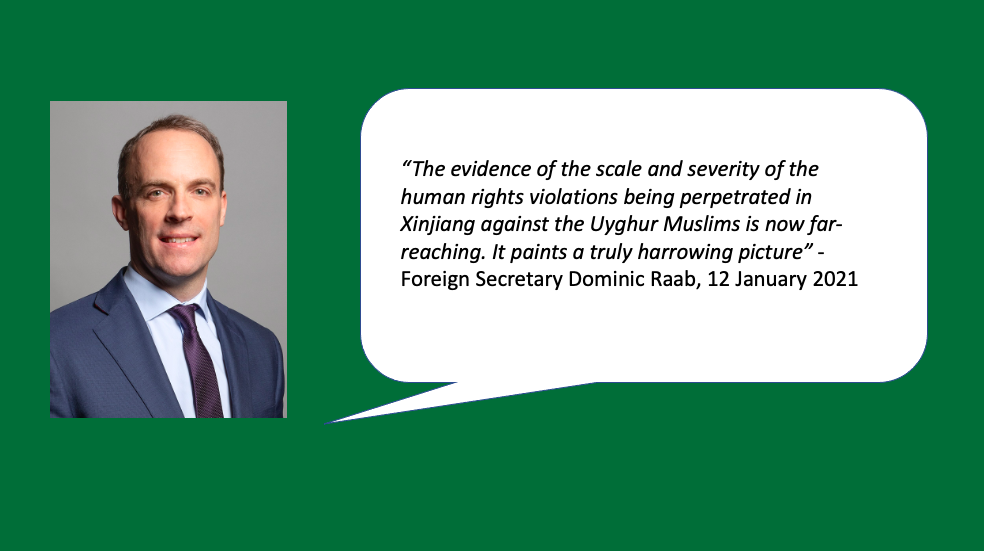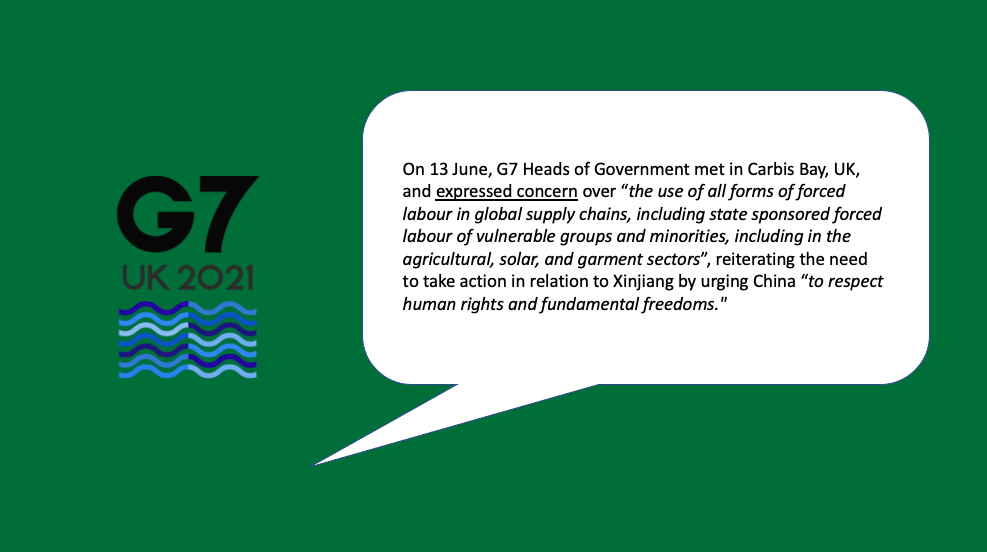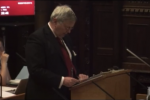Stopping British companies profiting from genocide
As a member of the Business, Energy and Industrial Strategy Select Committee, I led an inquiry into forced labour in UK supply chains. We heard expert witness testament detailing the horrific human rights abuses taking place in Xinjiang against the Uyghur people by the Chinese Communist Party - over one million people in 're-education camps', with mass beatings, rapes, and forced labour reported throughout the region.
The Board of Jewish Deputies noted in a letter to the Prime Minister the similarities between what is “alleged to be happening in the People’s Republic of China today and what happened in Nazi Germany 75 years ago: people being forcibly loaded on to trains; beards of religious men being trimmed; women being sterilised; and the grim spectre of concentration camps”.
So, our Committee presented a set of recommendations to the British Government to stop our country becoming complicit and British businesses profiting from this nightmare. In short, we wanted to make sure that no products created with slave labour, such as cotton picked for clothing or chemicals used for solar panelling, could end up in British shops and homes.

The major recommendations for the Business Department and Government
My report put forward 12 recommendations. Most of them were initially rejected by the Government. You can read the Department's justification here.
However, I have continued to campaign hard on this issue and I am delighted that the Government has, aside from sanctioning Chinese officials involved in the mass human rights abuses and slave labour throughout the region, now announced it will publish a blacklist of companies which are disbarred from public contracts on grounds of modern slavery. This is consistent with one of the report’s recommendations which called for:
“a blacklist of firms that have failed to provide evidence that they do not have supply chain links to Xinjiang or refuse to answer questions about possible links. These lists should also include companies that secure contracts from the UK Government, and an updated version should be published every six months. Companies that are operating in Xinjiang must prove that they are not in breach of the Modern Slavery Act 2015.”
This is a step in the right direction, but I will continue to shine a light on this issue to ensure we keep putting pressure on the Chine Communist Part (CCP) for their human rights abuses.
- ✅ Since the publication of my BEIS Report, I have spoken with Parliamentarians around the world, discussing ways they can implement their own supply chain transparency measures. We have met at events throughout Europe and America, discussing cutting edge ways to hold China and multinational firms to account.
- ✅ A few weeks after this report went live, I was sanctioned by the CCP. Ironically, this has done nothing to dampen my will to shine a light on these horrors, and has instead allowed Xinjiang to remain prominently in the spotlight.
- ✅ In April, I put a motion before Parliament, asking them to examine if all five markers for genocide were being met in Xinjiang - unanimously, Parliament spoke with one voice and declared genocide to be taking place against the Uyghur people.
- ✅ During the summer, the G7 countries made significant pledges around supply chain transparency. The Biden Administration had opened the year by issuing an Executive Order on America's Supply Chains.
- ✅ In November, the Uyghur Tribunal, an expert independent group, declared genocide to be taking place in Xinjiang. It noted "Hundreds of thousands of Uyghurs – with some estimates well in excess of a million – have been detained by PRC [People’s Republic of China] authorities without any, or any remotely sufficient reason, and subjected to acts of unconscionable cruelty, depravity and inhumanity. Sometimes up to 50 have been detained in a cell of 22 sq metres.” In declaring genocide, the Tribunal observed that “This vast apparatus of state repression could not exist if a plan was not authorised at the highest levels."
- ✅ In December, the British Government committed to a diplomatic (not sports!) boycott of the Beijing Winter Olympics. This is exactly what colleagues and I had called for earlier in the year.

What are other countries doing?
While the British Government has dragged its feet, other countries have made huge leaps forward:
- The USA has introduced into legislation the Uyghur Forced Labor Prevention Act. This is a massive win, which effectively bans all imports from China’s Xinjiang region. The US has tight rules on imports too. Section 307 of the Tariff Act of 1930 (19 U.S.C. § 1307) prohibits the importation of merchandise mined, produced or manufactured, wholly or in part, in any foreign country by forced or indentured labour – including forced child labour. Such merchandise is subject to exclusion and/or seizure, and may lead to criminal investigation of the importer(s). This is often used in an action called Withhold Release Orders. In essence, these allow Borders and Customs to target a certain produce; cotton and tomatoes for example.
- Canada has a series of Business Advisories across the region, aimed at giving companies the best information possible. It also has Senate Public Bill S-216, an Act to enact the Modern Slavery Act and to amend the Customs Tariff, coming through Parliament.
- Australia has Customs Amendment (Banning Goods Produced By Uyghur Forced Labour) Bill 2020 coming through its system, which will prohibit the importation into Australia of goods from Xinjiang as well as goods from other parts of China that are produced by using forced labour.
- European Commission president Ursula von der Leyen announced plans in September 2021 for a law that would place a “ban on products in our market that have been made by forced labour”.
Further reading
Attached below are a series of crucial documents for journalists, policymakers, analysts and those interested in this space.
